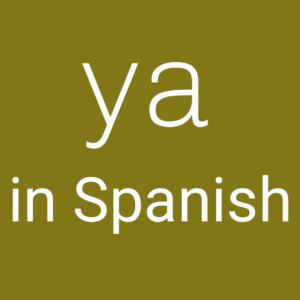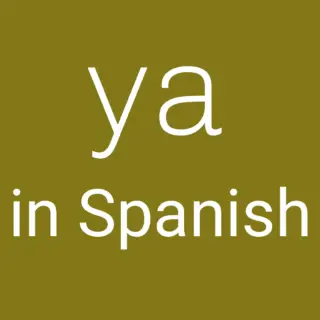Ya meaning in Spanish

When to use Ya in Wikipedia“>Spanish?. Already, right now, still, enough — these are just four of the dozens of possible translations of the Spanish ya.
Ya, which is usually an adverb but sometimes a conjunction, is one of those words whose meaning depends almost entirely on the context. Sometimes it doesn’t have much of a translatable meaning, becoming a filler word something like pues, adding a slight amount of emotional content to a sentence (although the exact nature of the emotional content may be difficult to determine out of the context).
Key Takeaways
Ya is usually an adverb, very common in speech, whose meaning depends almost on the context. It can express both resignation and surprise, both agreement and disbelief.
– The most common translations of ya include “now,” “still,” and “already.”
Sometimes, ya doesn’t need to be translated, as it can function as a filler word or a word that adds a vague emotional content rather than a denotation.
Most Common Meanings: ‘Now’ and ‘Already’
The most common meanings of ya are “now” and “already.” Often, it signifies a slight amount of impatience, although it sometimes can indicate satisfaction or agreement with the person being spoken to. As you might have guessed, it’s a word you’ll come across more often in informal conversation than you will in formal writing.
When the verb of the sentence is in a past tense, “already” is usually a good translation:
e.g.
Lo he leído ya. (I’ve already read it.)
El lunes ya lo habré visto. (By Monday I will have already seen it.)
¿Ya compraste tu boleto para la lotería? (Did you already buy your ticket for the lottery?)
No se puede romper lo ya qué está roto. (You can’t break what’s already broken.)
When the verb refers to an anticipated action, “now” is a common meaning. If the context or tone of voice suggests impatience, “right now” can also be used:
e.g.
Ya está aquí. (She’s here now.)
Ya salen. (They’re leaving now.)
Lo quiero ya. (I want it right now.)
Tienes qué estudiar ya. (You need to study right now.)
In some situations, you may be able to use either “already” or “now” in translation, such as when expressing surprise. The first sentence above, for example, might have been translated as “She’s already here.” And the question “¿Sales ya?” could mean either “You’re leaving now?” or “You’re leaving already?” When being rude, “¡Corta ya!” could be translated as either “Shut up now!” or “Shut up already!”
Other Translations for Ya
There are dozens of other ways you could interpret ya. Here are examples of other ways you could interpret ya:
Still, any more (especially when used in the negative):
Ya no trabaja aquí. (He doesn’t work here any more.)
Ya no están ganando dinero en la situación actual. (They aren’t making money any more in the current situation.)
To note that a wish has been satisfied:
¡Ya conseguí el trabajo! (I got the job!)
Ya entiendo las diferencias. (Finally I understand the differences.)
To indicate frustration:
¡Basta ya! (Enough is enough!)
¡Ya está bien!(That’s plenty!)
¡Ya era hora! (It’s about time!)
¡Vete ya! (Get yourself out of here!)
To indicate emphasis:
¡Ya lo sé! (I already know that!)
Es difícil, ya verás.(It’s difficult, you’ll see.)
Ya puedes empezar a estudiar. (You had better start studying.)
Él no comió, que ya es decir. (He didn’t eat, which is saying something.)
Ya me gustaría ser inteligente. (I’d love to be intelligent.)
Later (to indicate something will happen in the indefinite future):
Ya ocurrirá. (It’ll happen.)
Ya lo haré. (I’ll get it done.)
Excelente. Ya hablaremos.(Excellent. We’ll talk later.)
To express agreement or incredulity:
¡Ya, ya!(Oh, sure!)
Ya, y el papa es luterano. (Sure, and the pope is Lutheran.)
Ya, pero es difícil. (Yes, but it’s difficult.)
To call attention to something, especially when followed by que:
Ya que no está aquí, podemos salir. (Considering that he’s not here, we can leave.)
Ya que conocemos es fácil, podemos hacerlo. (Since we know it’s easy, we can do it.)
To offer reassurance:
Ya aprobarás el examen. (You’ll pass the test.)
Ya sabrás pronto. (You’ll know soon.)
To emphasize a connection between different facts:
Yo quisiera consultarte sobre este tema, ya que mi perro tiene esta conducta en diferentes situaciones. (I would like to talk to you about this, because my dog acts like this in different situations.)
La diamante era muy caro, ya lo compré. (It was very expensive, yet I bought it.)

Leave a Reply
You must be logged in to post a comment.